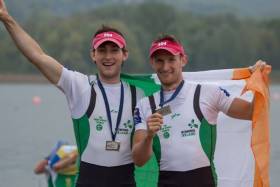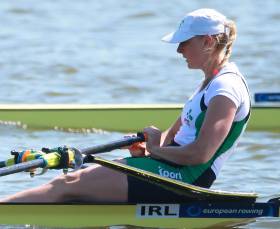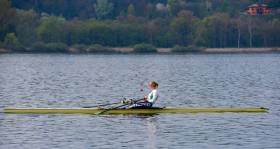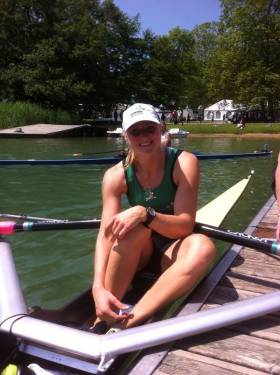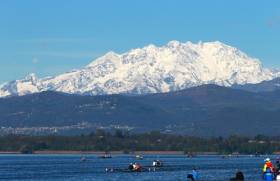Displaying items by tag: Puspure
Top Rowers Pull Together for Pieta House
#Rowing: A group of Ireland’s top rowers are hosting a special charity event this Sunday. The Run to Row at the National Rowing Centre in Farran Woods park in Cork is being held to raise funds for Pieta House, the charity which deals with people have suicidal ideation or who self-harm. There are prizes for families and for individuals who take part. Irish internationals Shane O’Driscoll, Mark O’Donovan and Sanita Puspure are behind the drive. “It’s alarming to hear of young people taking their own lives,” Puspure said. “All the funds from Sunday will go to Pieta House. There is a real need there.”
Puspure and Friends Best at Boston Rowing Regatta
#Rowing: Sanita Puspure was part of the top women’s crew at the Head of the Charles Regatta in Boston. The Old Collegians rower took the honours in the Women’s Championship Eights, with a crew of the top scullers in the world, stroked by American Genevra Stone.
Paul and Gary O’Donovan finished second in their final race, the Directors’ Challenge Men’s Quads. The Skibbereen men teamed up with John Collins and Jonathan Walton of Leander to form a crew which they called Crossing the Pond.
Head of the Charles River, Boston (Irish interest; selected results)
Saturday
Men
Championship Doubles: 8 P O’Donovan, G O’Donovan 17 min 39.742 seconds.
Women
Championships Doubles: 1 K Brennan, E Twigg 18:08.7, 2 M Lobnig, S Puspure 18:20.219.
Sunday (Provisional)
Men
Directors’ Challenge Quads: 2 Crossing the Pond (G O’Donovan, J Walton, J Collins, G O’Donovan) 16:30.304.
Women
Championship Eights: 1 Cambridge (S Puspure, M Knapkova, M Lobnig, J Gmelin, C Zeeman, E Twigg, K Brennan, G Stone; cox: E Driscoll) 16:30.368.
Puspure Excels at Head of the Charles Rowing Regatta
#Rowing: Ireland’s Sanita Puspure had an impressive result at the Head of the Charles Regatta in Boston. The Old Collegians rower teamed up with Magdalena Lobnig of Austria to finish second in the Women’s Championship Doubles behind Kim Brennan, the world and Olympic single sculls champion, and Emma Twigg.
Paul and Gary O’Donovan finished eighth in the Men’s Championship Double.
Head of the Charles River, Boston (Irish interest; selected results)
Men
Championship Doubles: 8 P O’Donovan, G O’Donovan 17 min 39.742 seconds.
Women
Championships Doubles: 1 K Brennan, E Twigg 18:08.7, 2 M Lobnig, S Puspure 18:20.219.
O'Donovans to Compete in United States
#Rowing: Ireland’s silver medallists from Rio 2016, Paul and Gary O’Donovan, will compete at the Head of the Charles Regatta in Boston on October 22nd and 23rd. The brothers will compete in the Championship Doubles on the Saturday and may also team up to form a quadruple on the Sunday.
Ireland Olympian Sanita Puspure will team up with Magdalena Lobnig of Austria in the women’s Championship Double, and both will be part of a Great Eight on the Sunday.
#Rowing: Sanita Puspure battled through awful conditons to take second place in her heat and qualifiy for the quarter finals of the single sculls at the Olympic Games in Rio de Janeiro. Carling Zeeman of Canada won the race well, with Puspure content - after an early struggle - to let her go and secure one of the other two quarter-finals places on offer. Nadia Negm of Egypt, struggling with her steering, actually pushed past Puspure at 1500 metres, but Puspure passed her in the better water in the final quarter.
Alan Campbell, competing for Britain, won his heat of the men's single sculls. The Coleraine man led from early on and easily qualified for the quarter-finals.
Olympic Games Rowing Regatta – Day One (Irish interest; selected results)
Men
Lightweight Four - Heat Two (Three Direct to Semi-Final): 2 Britain 6:01.27.
Single Sculls – Heat Four (First Three to Quarter-Finals; rest to Repechages): 1 Britain (A Campbell) 7:08.310.
Women
Single Sculls - Heat Three (First Three to Quarter-Finals; rest to Repechages): 1 Canada (C Zeeman) 8:41.12, 2 Ireland (S Puspure) 9:11.45, 3 Egypt (N Negm) 9:14.55
Puspure Wins Heat at Olympic Qualification Regatta
#Rowing: Sanita Puspure won her heat at the Olympic Qualification Regatta in Lucerne this morning and qualified directly for the semi-finals. Three places were available, but the Ireland single sculler took the lead early, and never relinquished it, though under pressure from double Olympic champion Ekaterina Karsten, who finished second. Nataliya Dovgodko of the Ukraine took third.
There is one extra place available for women’s single scullers at the qualifier as an invitation place set aside for delegations from small countries has not been taken up. Four will now qualify.
Olympic Qualification Regatta, Lucerne, Switzerland (Irish interest; selected results) – Day One:
Women
Single Sculls – Heat One (First Three to A/B Semi-Final; rest to Repechage): 1 Ireland (S Puspure) 7:38.55, 2 Belarus (E Karsten) 7:40.08, 3 Ukraine (N Dovgodko) 7:48.35; 4 Serbia 8:01.63, 5 Italy 8:03.08.
Heat Two: 1 Denmark (F Erichsen) 7:35.43, 2 Latvia (E Gulbe) 7:41.72, 3 Germany (J Richter) 7:42.23.
Heat Three: 1 New Zealand (E Twigg) 7:31.10, 2 Britain (M Hodgkins-Byrne) 7:39.01, 3 Russia (J Levina) 7:42.64.
#Rowing: Single sculler Sanita Puspure and the men’s lightweight double scull won their semi-finals to bring Ireland’s A Final tally to four at the European Rowing Championships in Brandenburg in Germany. The Ireland women’s lightweight double had to settle for a B Final place.
Paul O’Donovan and Gary O’Donovan produced an excellent finishing sprint to win their semi-final. Germany had led them down the course but the Cork brothers outpaced them in the dash to the line.
Puspure won a really good race, Nataliya Dovgodko of the Ukraine and and Lina Saltyte of Lithuania looked impressive in the first half in the tough, cross-headwind conditions, with Puspure also in the top three. Mirka Knapkova moved from fourth in the final seven hundred metres to dispute the lead, but Puspure finished strongly and kept her in second. Saltyte took third.
Sinéad Jennings and Claire Lambe finished fifth in their semi-final. Poland were impressive winners, with Denmark holding second for much of the race and Ireland disputing third with Romania. Britain pushed into the top four in the second half, but could not secure a top-three place. Romania pushed into second, ahead of Denmark. Britain finished fourth, one place ahead of Jennings and Lambe.
European Championships, Brandenburg, Germany – Day Two (Selected results, Irish interest)
Men
Lightweight Pair – Repechage (First Four to A Final; rest to B Final): 1 Denmark 7:26.63, 2 Ireland (M O’Donovan, S O’Driscoll) 7:27.99, 3 Germany 7:29.0, 4 Portugal 7:29.70.
Lightweight Double Sculls – Semi-Final One (First Three to A Final; rest to B Final): 1 Ireland (G O’Donovan, P O’Donovan) 7:00.52, 2 Germany 7:00.7, 3 Poland 7:08.37.
Women
Lightweight Double Sculls – Semi-Final Two (First Three to A Final; rest to B Final): 1 Poland 7:57.60, 2 Romania 8:01.47, 3 Denmark 8:03.45; 5 Ireland (C Lambe, S Jennings) 8:12.30
Single Sculls – Semi-Final One (First Three to A Final; rest to B Final): 1 Ireland (S Puspure) 8:44.67, 2 Czech Republic (M Knapkova) 8:45.61, 3 Lithuania (L Saltyte) 8:47.70.
Lightweight Single Sculls – Repechage (First Two to A Final; rest to B Final): 1 Ireland (D Walsh) 8:39.41, 2 Britain (I Walsh) 8:41.08.
Puspure in Command in European Heat
#Rowing: Sanita Puspure won her heat of the single sculls at the European Rowing Championships in Brandenburg, Germany, this morning. The Ireland competitor disputed the lead with Mathilde Hodgkins-Byrne of Britain in the early stages of the race, but took over on her own by half way and beat second-placed Elza Gulbe of Latvia by over four seconds. Gulbe and Hodgkins-Byrne also qualified directly for the semi-finals. Mirka Knapkova and Ekaterina Karsten were the top two in the second heat and Magdalena Lobnig won the third.
European Championships, Brandenburg, Germany – Day One (Selected results, Irish interest)
Women
Single Sculls – Heat One (First three to A/B Semi-Finals; rest to repechage): 1 Ireland (S Puspure) 8:09.55, 2 Latvia (E Gulbe) 8:13.73, 3 Britain (M Hodgkins-Byrne) 8:16.21.
Puspure Takes Command and Wins Semi-Final
#Rowing: Sanita Puspure won her semi-final and will compete in the A Final of the single sculls at the World Cup Regatta in Varese in Italy. The Ireland sculler powered into an early lead and never relinquished it. A battle for second and third was won by Tatsiana Kukhta of Belarus and Carling Zeeman of Canada, with Ukraine’s Nataliya Dovgodko missing out and going to the B Final.
World Cup Regatta, Varese – Day Two (Selected Results, Irish interest)
Men
Lightweight Four – C Final (places 13 to 16): 1 Canada One 6:09.73, 2 Serbia 6:11.21, 3 Austria 6:15.85, 4 Ireland (L Seaman, M O’Donovan, L Keane, S O’Driscoll) 6:16.00.
Women
Pair – C Final (places 13 to 16): 1 Norway One 7:22.74, 2 Ukraine 7:23.16, 3 Ireland (L Kennedy, B O’Brien) 7:33.07.
Single Sculls – A/B Semi-Final One (First Three to A Final; rest to B Final): 1 Ireland (S Puspure) 7:26.60, 2 Belarus Two (T Kukhta) 7:27.86, 3 Canada (C Zeeman) 7:29.01; 4 Ukraine 7:30.70, 5 Sweden 7:37.22, 6 Latvia 7:37.48.
Lightweight Double Sculls – C Final (places 13 to 17): 1 Ireland (C Lambe, S Jennings) 7:17.24, 2 Italy Three 7:26.29, 3 Chile 7:29.71.
Lightweight Single Sculls – Repechage (First Two to A Final; rest to B Final): 1 Poland Two 7:49.90, 2 Switzerland One 7:51.76; 5 Ireland Two (S McCrohan) 8:04.69, 6 Ireland One (D Walsh) 8:08.81
#Rowing: Sanita Puspure won her heat of the single sculls at the World Cup in Varese this morning, beating Olympic champion Mirka Knapkova in a close finish. Puspure goes on to the semi-finals, while Knapkova goes to a repechage.
Leonora Kennedy and Barbara O’Brien finished fifth of six in their heat of the women’s pair. They go into a repechage.
World Cup Regatta, Varese (Selected Results, Irish interest)
Women
Pair – Heat One (First Two to A/B Semi-Final; rest to Repechages): 1 Germany 7:23.08, 2 Russia One 7:24.46; 5 Ireland (L Kennedy, B O’Brien) 7:46.38.
Single Sculls – Heat One (Winner to A/B Semi-Finals; rest to Repechages): 1 Ireland (S Puspure) 7:34.32; 2 Czech Republic (M Knapkova) 7:36.13.



























